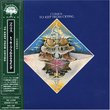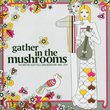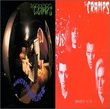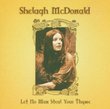| All Artists: Comus Title: First Utterance Members Wishing: 2 Total Copies: 0 Label: Phantom Sound & Vision Release Date: 12/28/2004 Album Type: Import Number of Discs: 1 SwapaCD Credits: 1 UPC: 766487513548 |
Search - Comus :: First Utterance
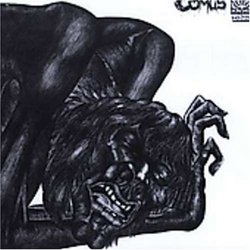 | Comus First Utterance
Comus' first album contains an imaginative if elusive brand of experimental folk-rock, with a tense and sometimes distressed vibe. At times, this straddles the border between folk-rock and the kind of songs you'd expect t... more » |
Larger Image |
CD DetailsSynopsis
Album Description Comus' first album contains an imaginative if elusive brand of experimental folk-rock, with a tense and sometimes distressed vibe. At times, this straddles the border between folk-rock and the kind of songs you'd expect to be sung at a witches' brew fest, the haunting supernatural atmosphere enhanced by bursts of what sound like a theramin-like violin, hand drums, flute, oboe, ghostly female backup vocals, and detours into almost tribal rhythms. Similar CDs
|
CD ReviewsA remarkable, twisted progressive folk classic Elliot Knapp | Seattle, Washington United States | 10/21/2007 (4 out of 5 stars) "If you couldn't tell from the cover, Comus' First Utterance album isn't a particularly sunny album. No--in fact, it's truly one of the darkest, scariest, most disturbing albums I've ever heard, in a way that makes me wonder "Who could actually think this up?" If you're put off by music with lyrics that graphically describe violence, madness, and rape, you'll probably be revolted and offended by First Utterance. If you don't mind separating yourself (and your idea of the songwriter) from the songs themselves, First Utterance is one of the most unique, fantastic, special, creative, and impressive albums you may ever hear. Even if you're of that persuasion (which I and many others are, it seems), the album is still a dark, taxing affair and has sort of a "car wreck" appeal--it's gruesome, but you can't help staring. Comus' special blend of...er, progressive folk-rock(?) is immediately palpable as "Diana" makes itself known. Jerking violins and a mischievous bass line are underscored by a sinuous and creepy slide guitar part. The singing is another story--many members of the group sing, but the dominant voice is Roger Wooton's. Throughout the album, he stretches the possibilities of his voice to fascinating lengths (one of the most innovative elements of the album, not unlike Captain Beefheart, if more tuneful), including low groans, demonic falsetto, and some really interesting singing-while-chest-thumping. "Diana" quickly picks up speed, and the tension bursts into a tribal explosion of hand drums. It's one of the shortest, most accessible songs on the album, despite its vague lyrics that seem to forbode some hazy violence in the forest. "The Herald" eases the dangerous sounds prefigured by "Diana"--it's easily the most gorgeous cut on the album, with some dreamy flute, some really technically impressive fingerstyle guitar and vocals, as it languidly tells its story over 12 minutes. Just when "The Herald" has lulled you into a false sense of peace, here comes "Drip Drip," a song about a murderer dragging his victim to her grave in the forest. As with "Diana," there's something morbidly, medievally British about this, and Comus manage to evoke the type of darkness and violence that must have been the reality of those days but hasn't been passed down with the cheery tales of Robin Hood etc. "Drip Drip" picks up where "Diana" left off, offering a portrait of the psyche of a killer. It is much more graphic, though, with some really gnarly grooves set up by slide guitar, violin and that urgent hand percussion. Echoing the jolting style changes of contemporaries like The Incredible String Band, around 7:00 the song busts into a spaced-out groove, before returning to form for a harrowing climax. "Song To Comus" is pretty similar, about Comus, who bewitches virgins with his flute playing, lures them to his cave, then rapes them. With these themes, it's hard to believe that the whole band actually got behind the music. The evidence is before us, though, in its bizarre glory, and Wooton's hypnotic repetitions ("play play play play...") are doubled by ghostly female harmony. It all unfolds over surprisingly driving grooves and some pounding acoustic guitar. The album's final highlight is "The Prisoner," another character study--this time, a mental patient. Slightly lighter fair than all-out villains, but still a bit unsettling and tragic, as the narrator's wild creativity is violently put down by his doctors, under the pretense of helping him. If you can stomach it, First Utterance is a brilliant album bristling with interesting musical ideas and fascinating (if insane) lyrics. The music here is definitely 5 stars, but this release, put out by Breathless, doesn't warrant 5 stars--about 7:00 into "The Herald" there are some quite audible sound defects (sounds like popping and scratching from old vinyl) that proceed a couple minutes into the next song. Not really acceptable, especially since I bought it brand new--it really cuts into some of the gorgeous guitar on "The Herald," and its' really distracts. If you're interested, I might suggest you try Song to Comus: The Complete Collection, which includes everything on this disc (even the 3 bonus tracks), as well as the entire belated 2nd album, which is supposed to be much less interesting than this one. I haven't gotten that one yet, but I'll comment on the sound quality as soon as I do." More People must rate this S. Koropeckyj | The Bright Side of the Moon | 07/22/2007 (5 out of 5 stars) "This album is about 25 years ahead of its time if not more. In fact, I can't really think of any band that is really similar to Comus. Until today, I had no idea that Comus was from the early 1970s... I just knew that they made some bizarre and insane sounds. First, album cover. Really cool looking. Buy the LP just so you can frame it and throw it on your wall, then stare at for about 20 minutes. Next, put the record on. It sounds like nothing else. Insane acoustic music, with vocals that sometimes sound like Fairport Convention and sometimes sound like Devin Townsend. I can't really pick apart the lyrics, but apparently they are about insanity, rape, violence, and whatever else. Pretty crazy for a band of that time. No flower power folk here. After that, the songs, well I don't know if I am going to call them songs... all blend together to form the album. Many songs go through so many changes that it seems as if they are different songs within the same track. So at the end of the day, the songs don't really matter, only the album does. Finally, listen to this when you are not on substances and you will feel like you are... listen to this on drugs and you will feel like you are Comus. That is all. Buy this album and tell your friends and rich relatives to buy multiple copies." Insane Folk Bill Your 'Free Form FM Handi Cyber | Mahwah, NJ USA | 06/19/2008 (5 out of 5 stars) "Comus made this album of very insane folk music in 1971. It is all accoustic, with a bass violin providing the backbone. The guitars are strummed hard, and the singer has a strong yet quivering voice, like Roger Chapman in Family,
The music is reletively simple, but played very intensely and is extremely dark. One track flows well into another. Very witchy music--if there were ever a justifacation for the term Acid Folk, this is it. Well worth buying." |

 Track Listings (7) - Disc #1
Track Listings (7) - Disc #1